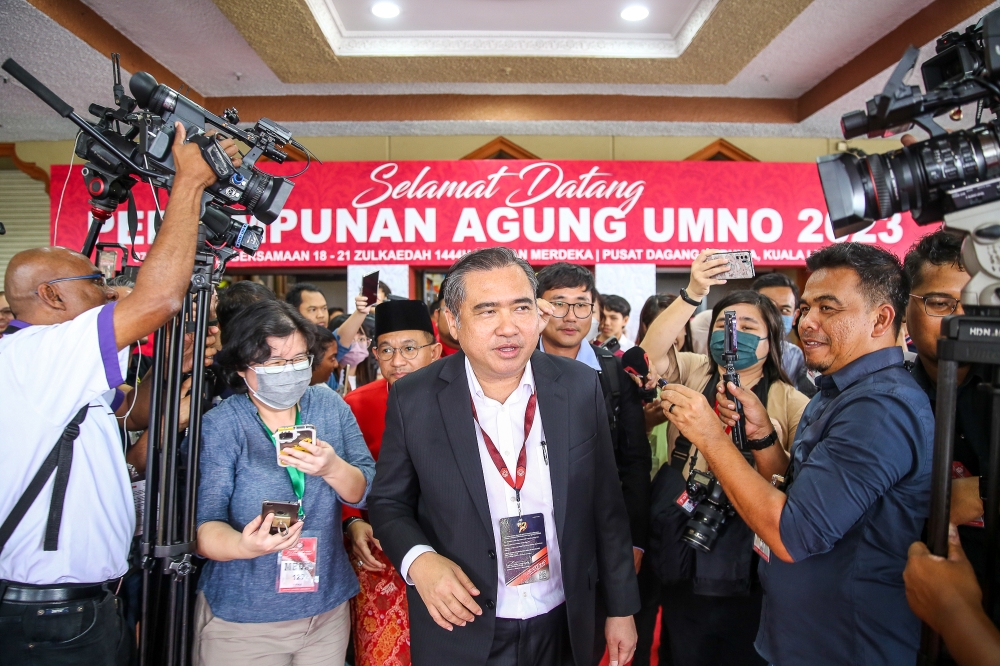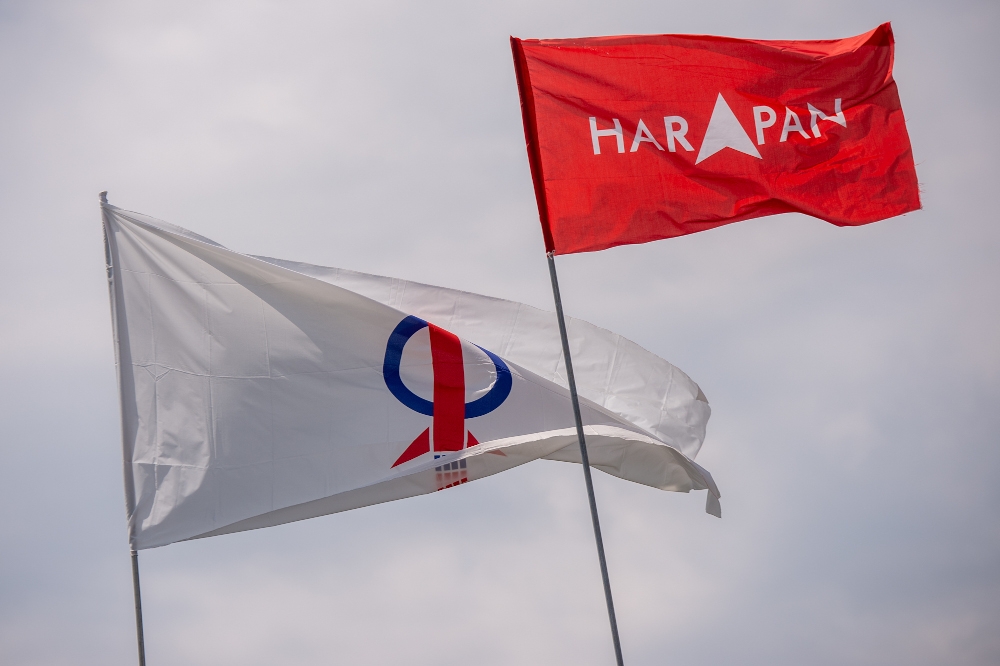By amending its constitution, pundits say DAP will trade away supporter base for mere chance of Malay votes

DAP courting Malay voters and abandoning its programmatic goals are two different matters, with its supporters likely to support the former and oppose the latter.— Picture by KE Ooi
Wednesday, 06 Sep 2023 7:00 AM MYT
KUALA LUMPUR, Sept 6 — DAP amending its party constitution to court Malay voters may convince allies that it is intent on cooperating with Umno but will alienate its original supporter base, political observers have suggested.
Syaza Shukri, assistant professor of political science at International Islamic University Malaysia, told Malay Mail that neither was there any guarantee that the move would attract Malay voters.
“Just because DAP changes its constitution doesn’t mean the Malays would suddenly accept DAP with open arms,” she cautioned.
The move has pros and cons and may help the bigger picture, but the rivalry between Umno and DAP is decades-old and may be too firmly rooted in the minds of Malay voters, she said.
“What I’m trying to say is that it will be a long time before Umno can fully convince its supporters that DAP is not extreme,” she said, adding that Umno had dubbed DAP as the enemy of Malays for years.
Although it could send the right signal to Umno, the move ultimately may not weaken or strengthen the unity government’s position as the support of grassroots will take time, she added.
Further, political analyst Wong Chin Huat said that DAP courting Malay voters and abandoning its programmatic goals are two different matters, with its supporters likely to support the former and oppose the latter.

Wednesday, 06 Sep 2023 7:00 AM MYT
KUALA LUMPUR, Sept 6 — DAP amending its party constitution to court Malay voters may convince allies that it is intent on cooperating with Umno but will alienate its original supporter base, political observers have suggested.
Syaza Shukri, assistant professor of political science at International Islamic University Malaysia, told Malay Mail that neither was there any guarantee that the move would attract Malay voters.
“Just because DAP changes its constitution doesn’t mean the Malays would suddenly accept DAP with open arms,” she cautioned.
The move has pros and cons and may help the bigger picture, but the rivalry between Umno and DAP is decades-old and may be too firmly rooted in the minds of Malay voters, she said.
“What I’m trying to say is that it will be a long time before Umno can fully convince its supporters that DAP is not extreme,” she said, adding that Umno had dubbed DAP as the enemy of Malays for years.
Although it could send the right signal to Umno, the move ultimately may not weaken or strengthen the unity government’s position as the support of grassroots will take time, she added.
Further, political analyst Wong Chin Huat said that DAP courting Malay voters and abandoning its programmatic goals are two different matters, with its supporters likely to support the former and oppose the latter.

DAP secretary-general Anthony Loke leaves the 2023 Umno general assembly at the World Trade Centre in Kuala Lumpur June 9, 2023. According to an analyst, the rivalry between Umno and DAP is decades-old and may be too firmly rooted in the minds of Malay voters. — Picture by Yusof Mat Isa
Wong, who is a political scientist with both the Jeffrey Cheah Institute on South-east Asia and the Jeffrey Sachs Centre on Sustainable Development, added that the suggestion by Umno supreme council member Datuk Nur Jazlan Mohamed comes from an outdated model of the two-coalition model.
The model was inspired by Barisan Nasional’s (BN) success in its heyday and assumes that the two competing coalitions would both be multiethnic and competing on the middle ground, leading to allies in a coalition minimising their ideological differences, he explained.
“Now, if our politics continues to be organised into two coalitions, it would be a monoethnic coalition taking on a multiethnic one, dragging the latter to the right," he said, referring to Perikatan Nasional versus PH-BN.
“Hence, elimination of internal differences within the multiethnic bloc would only cause it to lose its liberal/minority base.”
This would cause the liberal/minority supporters to support a new liberal party or protest by not voting, he added.
Meanwhile, James Chin, a University of Tasmania political science professor, agreed, adding that it was Umno that had demonised DAP to Malay voters.
“Umno [leaders] have demonised the DAP for the last 60 years and now they turn around... of course, the Malays will reject them, so it’s a bit disingenuous that Nur Jazlan is calling for DAP to change its constitution when it was Umno that turned [DAP’s constitution] into a problem,” he said.

Wong, who is a political scientist with both the Jeffrey Cheah Institute on South-east Asia and the Jeffrey Sachs Centre on Sustainable Development, added that the suggestion by Umno supreme council member Datuk Nur Jazlan Mohamed comes from an outdated model of the two-coalition model.
The model was inspired by Barisan Nasional’s (BN) success in its heyday and assumes that the two competing coalitions would both be multiethnic and competing on the middle ground, leading to allies in a coalition minimising their ideological differences, he explained.
“Now, if our politics continues to be organised into two coalitions, it would be a monoethnic coalition taking on a multiethnic one, dragging the latter to the right," he said, referring to Perikatan Nasional versus PH-BN.
“Hence, elimination of internal differences within the multiethnic bloc would only cause it to lose its liberal/minority base.”
This would cause the liberal/minority supporters to support a new liberal party or protest by not voting, he added.
Meanwhile, James Chin, a University of Tasmania political science professor, agreed, adding that it was Umno that had demonised DAP to Malay voters.
“Umno [leaders] have demonised the DAP for the last 60 years and now they turn around... of course, the Malays will reject them, so it’s a bit disingenuous that Nur Jazlan is calling for DAP to change its constitution when it was Umno that turned [DAP’s constitution] into a problem,” he said.

Umno supreme council member Datuk Nur Jazlan Mohamed said Umno has undertaken a ‘big sacrifice’ to cooperate with DAP, PKR and Parti Amanah Negara but had to pay a huge price for it as it is accused by the grassroots of allying itself with a party or pact that is “extreme”. — Picture by Shafwan Zaidon
He added that the Malaysian Malaysia ideology is very simple and would be seen as normal in any other country as the concept is merely about all Malaysian citizens being regarded as equal.
He expressed his belief that even if DAP were to go on to become more like MCA it would still find it difficult to attract Malay voters as it cannot cross the barrier of religion.
Last Wednesday, Nur Jazlan called on DAP to amend its constitution in order for the federal government coalition to gain support from Malay voters.
Nur Jazlan said Umno is expected to convince its grassroots of the alliance, but is having difficulties in doing so due to the perception of DAP’s purported “extreme” views on a secular state and “Malaysian Malaysia”.
He said Umno has undertaken a “big sacrifice” to cooperate with DAP, PKR and Parti Amanah Negara but had to pay a huge price for it as it is accused by the grassroots of allying itself with a party or pact that is “extreme”.
Despite Nur Jazlan’s claim, Clause II in DAP’s party constitution only describes the Federal Constitution as a secular document and a “secular framework as the supreme law of the land”.
Another article under the clause promoting national integration also called for the party to “infuse a national spirit and unity amongst all races to forge a common identity of a united Malaysian Malaysia”.
Since DAP became part of the unity government, both the party and Prime Minister Datuk Seri Anwar Ibrahim have insisted that it respects the positions of Malays, Islam and Malay Rulers in the country.
Most recently, Tun Dr Mahathir Mohamad alleged that the Anwar administration is being pressured by DAP’s MPs to discard Islam in favour of a secular and multi-ethnic country, contrary to the “Malayness” in the Constitution. PAS has also continued to attack DAP for its alleged secular and “Malaysian Malaysia” agenda.
He added that the Malaysian Malaysia ideology is very simple and would be seen as normal in any other country as the concept is merely about all Malaysian citizens being regarded as equal.
He expressed his belief that even if DAP were to go on to become more like MCA it would still find it difficult to attract Malay voters as it cannot cross the barrier of religion.
Last Wednesday, Nur Jazlan called on DAP to amend its constitution in order for the federal government coalition to gain support from Malay voters.
Nur Jazlan said Umno is expected to convince its grassroots of the alliance, but is having difficulties in doing so due to the perception of DAP’s purported “extreme” views on a secular state and “Malaysian Malaysia”.
He said Umno has undertaken a “big sacrifice” to cooperate with DAP, PKR and Parti Amanah Negara but had to pay a huge price for it as it is accused by the grassroots of allying itself with a party or pact that is “extreme”.
Despite Nur Jazlan’s claim, Clause II in DAP’s party constitution only describes the Federal Constitution as a secular document and a “secular framework as the supreme law of the land”.
Another article under the clause promoting national integration also called for the party to “infuse a national spirit and unity amongst all races to forge a common identity of a united Malaysian Malaysia”.
Since DAP became part of the unity government, both the party and Prime Minister Datuk Seri Anwar Ibrahim have insisted that it respects the positions of Malays, Islam and Malay Rulers in the country.
Most recently, Tun Dr Mahathir Mohamad alleged that the Anwar administration is being pressured by DAP’s MPs to discard Islam in favour of a secular and multi-ethnic country, contrary to the “Malayness” in the Constitution. PAS has also continued to attack DAP for its alleged secular and “Malaysian Malaysia” agenda.
No comments:
Post a Comment